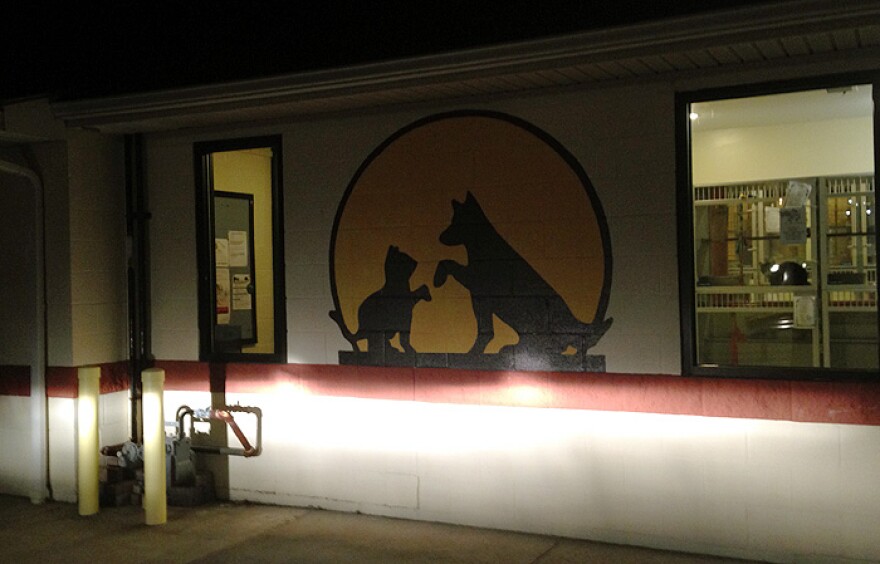Over the last decade, thousands of dogs rescued in Barren County have found new homes, not only in South Central Kentucky, but also in other parts of the country. It’s thanks to a partnership between a Glasgow animal shelter and PetSmart Charities.
A few minutes before five o’clock on a mild March morning in Glasgow, a large green van pulls into the parking lot of a one-story brick building. About a half-hour before, the lights of the animal shelter came on, an employee of the Barren River Animal Welfare Association took several shelter dogs out for a walk in preparation for the long road trip ahead. The destination for 24 dogs is a shelter in Dubuque, Iowa.
Volunteers begin streaming into the shelter’s lobby more than an hour before sunrise. It’s all-hands-on-deck for the next few furious minutes as they prepare the dogs for the journey on PetSmart Charities’ “Rescue Waggin’”
“Once they get here, we’re supposed to be able to load one dog every five minutes or three minutes," said Margie Patton, who runs the shelter in Glasgow. "Sometimes we can do that, sometimes we can’t. We have volunteers who will have dogs ready, so that when one goes out the door, the next one is ready to be checked by their vet tech."
The Barren River Animal Welfare Association, or BRAWA for short, is facing a problem that’s not uncommon in this area: too many pets and not enough homes. BRAWA has been a part of the Rescue Waggin’ program for 10 years and have sent over 5,000 dogs up north.
“Some parts of the country have had laws in place for a number of years about licensing… where if you have any kind of a dog that’s spayed or neutered, you might pay a really low price for the license and they’re very strict about licensing. If the dog is not spayed or neutered, you might pay 50 or 100 dollars for a license for that dog,” said Patton.
But Patton says some areas in the south don’t have those laws, leading to an abundance of dogs without homes.
On the Road
After the dogs pass inspection, Matthew Hatchett from PetSmart charities loads the dogs into crates in the back of the van for their journey to Iowa.
“Hopefully we take them from shelters that do euthanize to shelters that won’t euthanize them and find a good placement for them.”
He and his colleague, Shannie Henderson, settle into the vehicle’s cab for a 9-10 hour drive with two dozen dogs behind in the climate-controlled rear of the van.
“Usually they’re pretty quiet. They settle down just like a baby would during a car ride. We check them every four hours and give them food and water and make sure they’re still with us and alive and healthy,” said Henderson.

Gloria
One of the dogs boarding the Rescue Waggin’ this morning is Gloria, a hound-mix with a stark white coat. Robin Crane has been Gloria’s foster home for several days. Crane says Gloria is a sweet dog with plenty of energy.
“You care for them and you love them and you’re trying to get them into good habits as quickly as possible, because they’re more adoptable,” said Crane. “And people will realize they’re a loving dog if they learn to behave and to come when they’re called and know how to act and interact with other animals.”
Crane brought two foster dogs to load onto the Rescue Waggin’ today. At times, she’s fostered as many as eight.
“We’re just animal lovers, so we all come together. It’s kind of camaraderie and we share our experiences and our love for animals and our friendship,” said Crane.
The volunteers and shelter employees say they love seeing examples of animals being nurtured back to health.
“Four of the big puppies that you saw this morning were what we call ‘fixer-uppers’. Part of their litter had already died and they were extremely malnourished. Lots of hair loss, we thought maybe they had mange, but it turned out they didn’t – it was just from poor nutrition,” said Patton. “We decided to get them in good shape, because we knew if we got them in good shape, they could have a life. It’s very rewarding.”
Patton says nearly 660 dogs were adopted by local families last year. Combine that with the 430 sent elsewhere on the rescue wagon and it adds up to over a thousand dogs that were saved last year.




